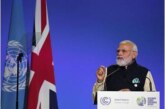By Dr Arvind Kumar
 Good governance is a sine qua non of every system, be it a family, society or a nation. Absence of good governance makes the system vulnerable to various machinations which are bound to wreck the system from within. The concept of “governance” is not new. It is as old as human civilization. In other words, “governance” means: ‘the process of decision-making and the process by which decisions are implemented (or not implemented).’ Governance can be used in several contexts such as corporate governance, international governance, national governance and local governance.
Good governance is a sine qua non of every system, be it a family, society or a nation. Absence of good governance makes the system vulnerable to various machinations which are bound to wreck the system from within. The concept of “governance” is not new. It is as old as human civilization. In other words, “governance” means: ‘the process of decision-making and the process by which decisions are implemented (or not implemented).’ Governance can be used in several contexts such as corporate governance, international governance, national governance and local governance.
Since governance is the process of decision-making and the process by which decisions are implemented, an analysis of governance focuses on the formal and informal actors involved in decision-making and implementing the decisions made and the formal and informal structures that have been set in place to arrive at and implement the decision.
Government is one of the actors in governance. Other actors involved in governance vary depending on the level of government that is under discussion. In rural areas, for example, other actors may include influential land lords, associations of peasant farmers, cooperatives, NGOs, research institutes, religious leaders, finance institutions political parties, the military etc. The situation in urban areas is much more complex. Figure 1 provides the interconnections between actors involved in urban governance. At the national level, in addition to the above actors, media, lobbyists, international donors, multi-national corporations, etc. may play a role in decision-making or in influencing the decision-making process.
All actors other than government and the military are grouped together as part of the “civil society.” In some countries in addition to the civil society, organized crime syndicates also influence decision-making, particularly in urban areas and at the national level.
Similarly formal government structures are one means by which decisions are arrived at and implemented. At the national level, informal decision-making structures, such as “kitchen cabinets” or informal advisors may exist. In urban areas, organized crime syndicates such as the “land Mafia” may influence decision-making. In some rural areas locally powerful families may make or influence decision-making. Such, informal decision-making is often the result of corrupt practices or leads to corrupt practices.
The UPA-II having completed second year of its tenure suddenly finds itself trapped between a rock and a hard place on the issue of fighting corruption by setting up the institution of the Lok Pal. According to a recent editorial in The Pioneer, the so-called representatives of ‘civil society’ led by Anna Hazare, a first of its kind which not only flies in the face of parliamentary tradition but sets a dangerous precedent of the executive abdicating its authority and responsibility, are adamant that their version of what they call the ‘Jan Lok Pal Bill’, which is stuffed with absurdities, including empowering the Lok Pal to monitor the activities of Members of Parliament inside the Lok Sabha and the Rajya Sabha, must prevail over common sense and reason.
Lamenting that the Government cannot be faulted for seeking to keep the offices of the Prime Minister and the Chief Justice of India outside the purview of the Lok Pal’s jurisdiction, the editorial opines that the chief executive and the senior most member of the judiciary are presumed to be, and must continue to be presumed to be, individuals with unimpeachable integrity. “If we were to begin doubting their credentials and casting aspersions on them, then, by the same logic a Super Lok Pal should be appointed to ensure that the Lok Pal does not stray from the strait and the narrow.”
It is equally absurd to suggest that the Lok Pal should have the power to scrutinize policy decisions of the Government: That would not only cripple the executive but also render the legislature irrelevant. The Government is answerable to the people of India, not self-appointed guardians of morality, ethics and probity. Yet, there is no cause to feel sorry for the Government which now finds itself confronted by an intransigent and cussed lot who believe that they alone are virtuous.
A Government weakened by corruption at high levels, exemplified by the Great 2G Spectrum Robbery right under the nose of the Prime Minister, had no other option but to bend over backward to accommodate Anna Hazare and his men in the drafting committee; had it been strong and upright, it could have told them to go take a walk. Similarly, having painted itself into a corner, the UPA regime now finds itself groveling before Baba Ramdev who plans to stage a huge protest in Delhi against the Government’s failure to act on the issue of black money despite several promises to do so.
The issue raised by either Anna Hazare or Baba Ramdev is not misplaced and unwarranted. They have successfully articulated popular anger against mounting corruption and an effete Government’s inability to confront the menace fearlessly. But while community leaders like Anna Hazare and Baba Ramdev are well within their rights to mobilize public opinion and bring pressure on the Government, they cannot be seen to be dictating policy and action — that must remain the realm of the executive and the legislature.
Much as we may deride the ‘system’ and tar all politicians with the same brush, we must remember that our democracy has survived and flourished precisely because of the ‘system’ that, while corroded, still facilitates the democratic functioning of the Government and its allied institutions. True, the rot has to be checked. But that can be achieved only if India’s crisis of leadership comes to an end.
In the name of rapid economic growth policy decisions are increasingly being taken giving regard to the interest of the market and big business. Could we reverse this process to give primacy to the principles of ‘antodaya’ without sacrificing growth? If that happens, good governance could be better ensured. Such governance under a sensitive leadership could provide capacity to build our inclusive polity and a future full of possibilities for everyone.



